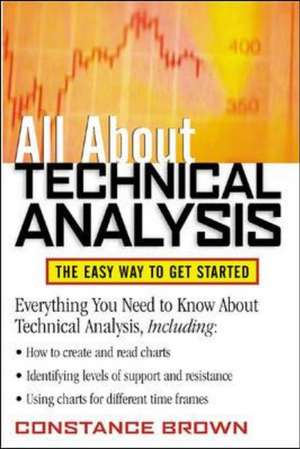All About Technical Analysis
Autor Constance Brownen Limba Engleză Paperback – 16 dec 2002
Preț: 187.44 lei
Preț vechi: 213.86 lei
-12% Nou
Puncte Express: 281
Preț estimativ în valută:
35.86€ • 37.45$ • 29.62£
35.86€ • 37.45$ • 29.62£
Carte tipărită la comandă
Livrare economică 17-23 aprilie
Preluare comenzi: 021 569.72.76
Specificații
ISBN-13: 9780071385114
ISBN-10: 0071385118
Pagini: 288
Dimensiuni: 150 x 224 x 22 mm
Greutate: 0.45 kg
Editura: McGraw Hill Education
Colecția McGraw-Hill
Locul publicării:United States
ISBN-10: 0071385118
Pagini: 288
Dimensiuni: 150 x 224 x 22 mm
Greutate: 0.45 kg
Editura: McGraw Hill Education
Colecția McGraw-Hill
Locul publicării:United States
Cuprins
Part One: What is Technical Analysis, and Who Can Benefit?
Chapter 1: Could Charts Have Called the Enron Collapse?
Chapter 2: What Is Technical Analysis and Who Uses It?
Chapter 3: Can Mutual Fund Investors Use Technical Analysis?
Part Two: How to Create Charts
Chapter 4: How to Get the Data into Your Computer
Chapter 5: Weekly, Monthly, and Intraday Time Intervals: How to Display the Data
Chapter 6: How Asian Traders Prefer to Display Data
Chapter 7: Why the U.S. Dollar Dictates the Longevity of an American Equity Bull Market
Chapter 8: Help! Short- and Long-Term Interest Rates Are Really Confusing
Money Market Securities or Short-Term Interest Rate Markets
Intermediate- and Long-Term Fixed Income Markets
Price-to-Yield Relationship
Yield to Maturity versus Realized Yield
Yield Curves
Chapter 9: Why a North American Needs International Market Data
Chapter 10: Wait a Minute! Isn’t That Real Estate Data?
Part Three: How to Read the Data to Make a Decision
Chapter 11: A Big-Picture Summary of the Different Approaches within Technical Analysis
Category One: Does the Method or Technique Depend on Pattern Recognition?
Category Two: Does the Method Focus on the Geometric Mathematical Relationships within the Market’s Price Data or Indicators?
Category Three: Does the Method Strive to Identify Behavioral Traits and Study Extremes of Market Participants?
Category Four: Does the Method Strive to Detect Correlations between Different Markets to Determine If One Market Is Providing a Leading Signal for Another?
Chapter 12: Directional Patterns and Signals within the Data
Chapter 13: Why Are There Holes in My Data?
Chapter 14: Understanding Trends and Basic Market Geometry
Chapter 15: Using Market Geometry for Price Projections
Chapter 16: Ways to Detect Market Extremes Using Price, Breadth, and Sentiment
Chapter 17: The Hottest Stock since Green Ketchup! How to “Listen” to the Media with a Technical Mindset
Part Four: How to Handle Specific Problems
Chapter 18: Price Targets for Stocks Just Listed and Other Challenges
How Do You Calculate Support or Resistance for a Stock Just Listed with No Historical Data?
How Do You Calculate Market Support When the Index Has Fallen below Historic Price Lows?
How Do You Calculate a Price Objective When the Stock or Market Is Trading above Historic Highs?
How the Internet Can Lead You to a Poor Market Decision
What Is the Global Industry Classification Standard and How Do You Use Stock Sectors for Analysis?
Part Five: Lessons From Global Market Shock Waves
Chapter 19: Lessons from Global Market Shock Waves
The Americas Catch the Asian Flu in 1998
The “Dot Gones”: Researching Opportunities after a Market Implodes
September 11, 2001
Part Six: Why Does Technical Analysis Work?
Chapter 20: What Do Seashells, Hurricanes, and the Dow Jones Industrial Average All Have in Common?
Chapter 21: A Universal Higher Order and How All Things Are Indeed Connected
Part Seven: Market Cycles and Long-Term Cycles of Importance
Chapter 22: Market Cycles and Long-Term Cycles of Importance
Part Eight: Putting it All Together with Risk Exposure in Mind
Chapter 23: A Broker Has Just Recommended that You Buy a Stock. What Do You Do Next?
Chapter 24: The 27 Million Dollar Lunch
Appendix A: The Growth of Technical Analysis in Universities and Colleges
Technical Analysis Academic Programs
Coming Soon—Curriculum Under Development
Technical Analysis Organizations
Index
Chapter 1: Could Charts Have Called the Enron Collapse?
Chapter 2: What Is Technical Analysis and Who Uses It?
Chapter 3: Can Mutual Fund Investors Use Technical Analysis?
Part Two: How to Create Charts
Chapter 4: How to Get the Data into Your Computer
Chapter 5: Weekly, Monthly, and Intraday Time Intervals: How to Display the Data
Chapter 6: How Asian Traders Prefer to Display Data
Chapter 7: Why the U.S. Dollar Dictates the Longevity of an American Equity Bull Market
Chapter 8: Help! Short- and Long-Term Interest Rates Are Really Confusing
Money Market Securities or Short-Term Interest Rate Markets
Intermediate- and Long-Term Fixed Income Markets
Price-to-Yield Relationship
Yield to Maturity versus Realized Yield
Yield Curves
Chapter 9: Why a North American Needs International Market Data
Chapter 10: Wait a Minute! Isn’t That Real Estate Data?
Part Three: How to Read the Data to Make a Decision
Chapter 11: A Big-Picture Summary of the Different Approaches within Technical Analysis
Category One: Does the Method or Technique Depend on Pattern Recognition?
Category Two: Does the Method Focus on the Geometric Mathematical Relationships within the Market’s Price Data or Indicators?
Category Three: Does the Method Strive to Identify Behavioral Traits and Study Extremes of Market Participants?
Category Four: Does the Method Strive to Detect Correlations between Different Markets to Determine If One Market Is Providing a Leading Signal for Another?
Chapter 12: Directional Patterns and Signals within the Data
Chapter 13: Why Are There Holes in My Data?
Chapter 14: Understanding Trends and Basic Market Geometry
Chapter 15: Using Market Geometry for Price Projections
Chapter 16: Ways to Detect Market Extremes Using Price, Breadth, and Sentiment
Chapter 17: The Hottest Stock since Green Ketchup! How to “Listen” to the Media with a Technical Mindset
Part Four: How to Handle Specific Problems
Chapter 18: Price Targets for Stocks Just Listed and Other Challenges
How Do You Calculate Support or Resistance for a Stock Just Listed with No Historical Data?
How Do You Calculate Market Support When the Index Has Fallen below Historic Price Lows?
How Do You Calculate a Price Objective When the Stock or Market Is Trading above Historic Highs?
How the Internet Can Lead You to a Poor Market Decision
What Is the Global Industry Classification Standard and How Do You Use Stock Sectors for Analysis?
Part Five: Lessons From Global Market Shock Waves
Chapter 19: Lessons from Global Market Shock Waves
The Americas Catch the Asian Flu in 1998
The “Dot Gones”: Researching Opportunities after a Market Implodes
September 11, 2001
Part Six: Why Does Technical Analysis Work?
Chapter 20: What Do Seashells, Hurricanes, and the Dow Jones Industrial Average All Have in Common?
Chapter 21: A Universal Higher Order and How All Things Are Indeed Connected
Part Seven: Market Cycles and Long-Term Cycles of Importance
Chapter 22: Market Cycles and Long-Term Cycles of Importance
Part Eight: Putting it All Together with Risk Exposure in Mind
Chapter 23: A Broker Has Just Recommended that You Buy a Stock. What Do You Do Next?
Chapter 24: The 27 Million Dollar Lunch
Appendix A: The Growth of Technical Analysis in Universities and Colleges
Technical Analysis Academic Programs
Coming Soon—Curriculum Under Development
Technical Analysis Organizations
Index











